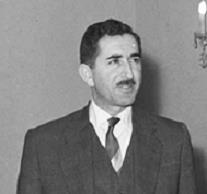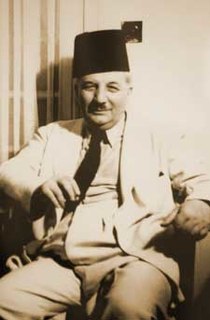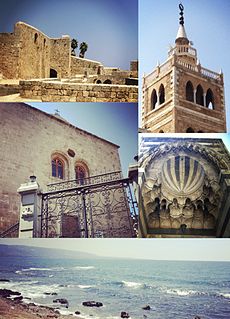
Kamal Fouad Jumblatt was a prominent Lebanese politician. He was the main leader of the anti-government forces who opposed the Assad government in the Lebanese Civil War and major ally of the Palestine Liberation Organization until his assassination in 1977. He is the father of the Lebanese Druze leader Walid Jumblatt.

Rashid Abdul Hamid Karami was a Lebanese statesman. He is considered one of the most important political figures in Lebanon for more than 30 years, including during much of Lebanese Civil War (1975–1990), and he served as prime minister ten times, making him the most democratically elected prime minister in history according to the Guinness Book of World Records 2005

Muhammad Assem Qanso is a Lebanese politician. He is a former leader of the Lebanese Ba'ath Party.

Abdul Hamid Karami was a Lebanese political and religious leader, who had nationalistic Arab inclinations.

Riad Al Solh was the first prime minister of Lebanon after the country's independence.

The Arab Socialist Ba'ath Party, also referred to as the pro-Iraqi Ba'ath movement, is a Ba'athist political party which was headquartered in Baghdad, Iraq until 2003. It is one of two parties which emerged from the 1966 split of the original Ba'ath Party.

The Socialist Arab Lebanon Vanguard Party is a political party in Lebanon. The party was led by Abd al-Majid al-Rafei until his death in July 2017. It is the Lebanese regional branch of the Iraqi-led Ba'ath Party. The party held its second congress in October 2011. Founders of the party included Dr. Abd al-Majid al-Rafei, Jihad George Karam, Rafiq Nasib Alfaqiya, Karam Mohamed Assahli, Hani Mohamed Shoiab, Ammar Mohamed Shabli, Hassan Khalil Gharib and Asaf Habin Alharakat.

The Bloudan Conference of 1937 was the first pan-Arab summit held in Bloudan, Syria on 8 September 1937. The second Bloudan conference was held nine years later in 1946.
Lebanese Sunni Muslims refers to Lebanese people who are adherents of the Sunni branch of Islam in Lebanon, which is the largest denomination in Lebanon tied with Shia Muslims. Sunni Islam in Lebanon has a history of more than a millennium. According to a CIA study, Lebanese Sunni Muslims constitute an estimated 27% of Lebanon's population.
Leila Al Solh is the vice president of Alwaleed bin Talal Humanitarian Foundation and a former Lebanese minister of industry.

Major General Muhammad Umran was a founding member of the Military Committee of the unitary Ba'ath Party, and a leading personality in Syrian politics from the 8th of March Revolution until the 1966 Syrian coup d'état.
Voting to elect five members of the Lebanese parliament took place in Tripoli City in 1968, part of the national general election of that year. Four of the seats of the constituency were earmarked for the Sunni Muslim community, whilst the fifth seat was allocated to the Greek Orthodox community. The Tripoli City constituency had 64,913 eligible voters, out of whom 22,813 voted.
Abd al-Majid al-Rafei, born in Tripoli, Lebanon, was a Lebanese politician and member of the Lebanese Parliament. He was at one time the head of the Iraqi faction of the historical Ba'ath Arab Socialist Party and its Iraqi wing. Later, until his death in July 2017, he was the head of the Socialist Arab Lebanon Vanguard Party.

Beirut II was a parliamentary constituency in Lebanon. It covered three neighbourhoods (quartiers) of the capital; Dar El Mreisse, Zuqaq al-Blat and Bachoura. Michael Hudson described Beirut II as a 'small "catch-all" district'. This constituency was used in the 1960, 1964, 1968 and 1972 elections.
Farid Youssef Jubran was a Lebanese Latin Catholic politician. He was born in 1911. Jubran was one of the co-founders of the Progressive Socialist Party in 1949. Outside politics Jubran owned a Beirut-based auditing firm.

In Lebanese politics Minorities is a term that includes six different Christian sects; Syriac Orthodox, Syriac Catholics, Latin Catholics, Assyrian Catholics, Chaldean Catholics and Coptic Orthodox. 1 of the 128 seats in the national parliament is allocated to Minorities. The Minorities' seat is elected from Beirut III electoral district, an electoral district with a large Sunni Muslim majority.
Joseph Chader was a Lebanese Armenian Catholic politician. He was a Member of Parliament between 1951 and 1977, and served as deputy speaker at times. In 1958 he became the first Armenian government minister in Lebanon. He served as vice chairman of the Kataeb Party.

Kazem El-Solh was a Lebanese politician, a diplomat and the founder of a political party and a newspaper. He was a member of parliament in Lebanon and served as the country's ambassador to Iraq. He hails from a prominent Sunni Muslim family which gave Lebanon four prime ministers, his brother Takieddine Solh, as well as Riad Solh, Sami Solh and Rachid Solh. The Solh family is originally from the ancient port city of Sidon in southern Lebanon.

Raghid Kazem El-Solh was a Lebanese writer and researcher in international and Arab regional relations as well as democracy issues. He published several books about international relations, the Arab region and democracy. He was a regular contributor to several publications including the London-based pan-Arab Al-Hayat newspaper, and was a regular lecturer, political commentator and a consultant for the UN and other organizations.















